Publication for this book was supported by funding from the Deans Office of the School of Liberal Arts at Tulane University.
2017 by the Board of Trustees
of the University of Illinois
All rights reserved
Manufactured in the United States of America
1 2 3 4 5 C P 5 4 3 2 1

This book is printed on acid-free paper.
Library of Congress Cataloging-in-Publication Data
Names: Haugeberg, Karissa, 1978 author.
Title: Women against abortion: inside the largest moral reform movement of the twentieth century / Karissa Haugeberg.
Description: Urbana: University of Illinois Press, [2017] | Series: Women, gender, and sexuality in American history | Includes bibliographical references and index.
Identifiers: LCCN 2016046278 (print) | LCCN 2017002170 (ebook) | ISBN 9780252040962 (cloth : alk. paper) | ISBN 9780252082467 (pbk. : alk. paper) | ISBN 9780252099717 (e-book) | ISBN 9780252099717 (E-book)
Subjects: LCSH : Pro-life movementUnited StatesHistory20th century. | AbortionMoral and ethical aspectsUnited StatesHistory20th century. | WomenPolitical activityUnited StatesHistory20th century.
Classification: LCC HQ 767.5. U 5 H 397 2017 (print) | LCC HQ 767.5. U 5 (ebook) | DDC 320.082/0973dc23
LC record available at https://lccn.loc.gov/2016046278
Acknowledgments
I am indebted to Linda K. Kerber for sharing her recipe for studying the past: ask serious questions, investigate tirelessly the context that shaped peoples experiences, and write honestly, with an eye for originality. I am grateful to Johanna Schoen for her wise counsel and her enthusiasm for this book. Thank you to Douglas Baynton, Constance Berman, Colin Gordon, Sarah Hanley, Elisabeth Heineman, Susan Lawrence, and Paula Michaels. I am grateful to the Laurence Lafore family; the Gerald R. Ford Library; the Mary Lily Research Fellowship, Sallie Bingham Library at Duke University; the Marcus Bach Fellowship; and the Ballard Seashore Fellowship for enabling me to conduct research and to write.
Thank you to my Iowa City friends: Michelle Armstrong-Partida, Michael Bortscheller, Jo Butterfield, Noaquia Callahan, Caroline Campbell, Christy Clark-Pujara, Matthew Conn, Heather Cooper, Anna Flaming, Justus Hartzok, Michael Hevel, Sylvea Hollis, Sharon Lake, Kren Mason, Scott McKenzie, John McKerley, Angela Miller Keysor, Katherine Massoth, Brian Miller, Dana Quartana, Gabriele von Roedern, Sharon Romeo, Sue Stanfield, Robert Starkins, Kate Stewart, Charissa Threat, and Janet Weaver. I would also like to acknowledge my late dance partner, Jake Hall, whom I miss every day.
When I arrived at Tulane University, I was welcomed by colleagues who were smart, curious, and unfailingly kind. Thank you to Yigit Akin, Rosanne Adderley, George Bernstein, Emily Clark, Brian DeMare, Lupe Garca, Blake Gilpin, Andy Horowitz, Jana Lipman, Tom Luongo, Liz McMahon, Linda Pollock, Sam Ramer, Randy Sparks, and Justin Wolfe. Special thanks to Elisabeth McMahon and Christopher Harter for welcoming me to their home for delicious dinners and conviviality. Support from the Andrew W. Mellon Foundation, the family of Dora Bonquis, the School of Liberal Arts at Tulane University, and the Newcomb College Institute at Tulane University enabled me to conduct additional research and to revise the manuscript. I am grateful to Sally Kenney for nurturing and sustaining the study of women and gender at the Newcomb College Institute. A grant from the School of Liberal Arts assisted with the publication of this book.
I am grateful to the activists who let me interview them and opened their organizational records to me. Julianne Wiley was especially generous with her time, often answering emails within minutes of receiving them. Ann Scheidler welcomed me to the Pro-Life Action League headquarters in Chicago, where she scanned dozens of photographs, many of which appear in this book. Angie Thomas invited me to the Womans New Life Center, and has helped to answer my questions about womens work in crisis pregnancy centers. Myrna Shaneyfelt continues to send me materials years after we first discussed her work organizing the first generation of antiabortion activists in Oregon.
Laurie Matheson, Dawn Durante, and Brigette Brown have been terrific stewards of this book at the University of Illinois Press. I am grateful to them for pairing me with marvelous readers, including Susan Freeman, whose suggestions prompted me to reimagine the story I had to tell. My work has also benefited from the questions posed at the Newberry Library Seminar on Womens and Gender History and the Seminar on Historical Change and Social Theory at Tulane University, the American Historical Association, and the Western Association of Women Historians.
I am indebted to Zulal Akin, Janet Allured, Barbra Barnett, Anne Barthel, Ben Benus, Tracy Buccino, Cari Campbell, Christy Clark-Pujara, Clare Daniel, Lani Hedberg, Brandon Hoffmann, Shannon Hysjulien, Amy Irvin, Cherie Lemer, Becca Lieberg, Jennie Lightweis-Goff, Mike Locken, Kate Lowe, Karletta Marwede, Michelle Mathura, Liz McMahon, Angela Mills, Andrea Mosterman, Jamie Selzler, Charissa Threat, Rebecca Tuuri, Flora Williams, and Laura Wolford.
Thank you, Kate Stewart, for always taking my calls and for providing me an escape on Capitol Hill, replete with Greg Marschs cocktails. Thanks to Michael Hevel, who joins me via FaceTime most days to whittle away the hours writing and reading. Finally, Im grateful to have had the support of my parents, Lowell and Kay Haugeberg, and my brother and sister-in-law, Brent and Rhodora Haugeberg. I was fortunate to have grown up in a household filled with books, puns, and lovepuns and puns of love.
WOMEN
AGAINST
ABORTION
Introduction
W omen against Abortion traces the history of women in the American antiabortion movement by exploring the actions and writings of those who shaped the trajectory of the largest moral reform movement of the late twentieth century. This story begins in the late 1960s, with Marjory Mecklenburgs work to shift antiabortion leaders attention from the rights of fetuses to the needs of pregnant women. It extends into the 1970s and 1980s, with the grassroots work of Juli Loesch and Joan Andrews, two Catholic women whose activism and leadership coincided with the influx of evangelical Protestants into the pro-life movement. It concludes in the 1990s with Shelley Shannon, an evangelical Protestant who emerged as one of the most prominent pro-life extremists of the late twentieth century.
Most of the women profiled here shaped the American antiabortion movement not through leadership positions in conventional groups but instead as members of grassroots organizations. Conventional antiabortion groups, including the National Right to Life Committee (NRLC) and Americans United for Life, had formal leadership structures and usually had national and regional offices. These groups had official publications, constitutions, professional staff, and focused on legal or legislative strategies to end abortion. NRLC was the largest antiabortion group in the nation, with millions of members and chapters in every state by the late 1970s. Although many of the women in this book participated in conventional antiabortion organizations at some point during their careers, most concentrated on grassroots efforts to end abortion. Grass-roots antiabortion organizations generally adopted less formal structures. They usually operated at the local or regional level and were led by volunteers. Some grassroots organizations had elected officers, but many did not. This book analyzes women who participated in grassroots organizations, including Prolifers for Survival and The Army of God, as well as those who adopted grassroots strategies for fighting abortion, including those who worked in crisis pregnancy centers or participated in clinic rescues.


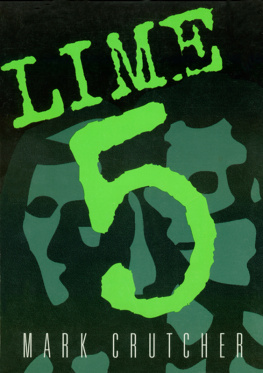
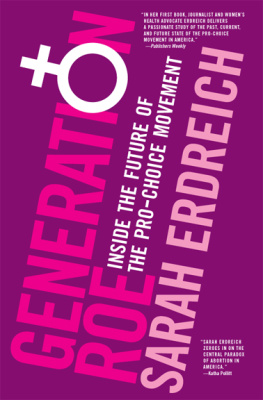
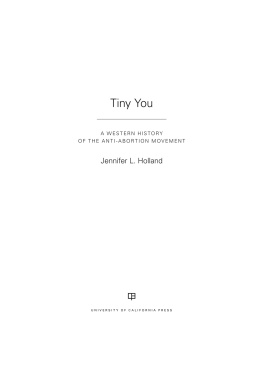
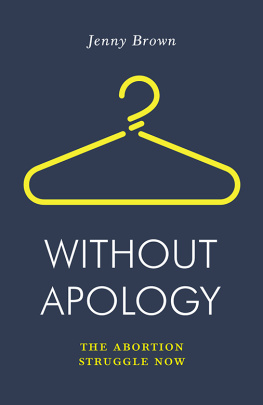
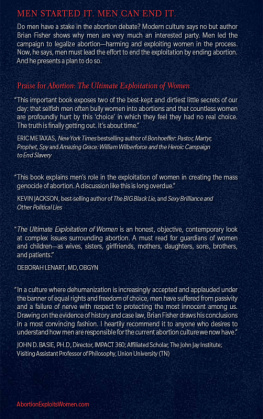


 This book is printed on acid-free paper.
This book is printed on acid-free paper.